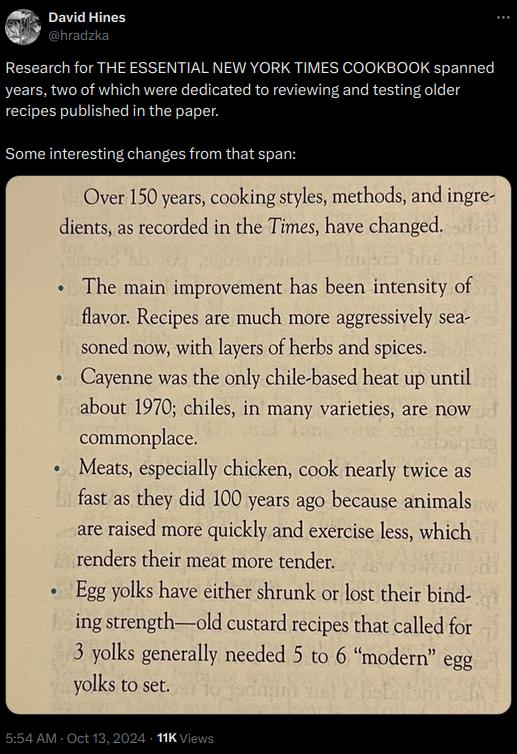Funny how the objections ITT are over the items that would cause people to have to reevaluate the ethics of their dietary choices.
Science of Cooking
Welcome to c/cooking @ Mander.xyz!
We're focused on cooking and the science behind how it changes our food. Some chemistry, a little biology, whatever it takes to explore a critical aspect of everyday life.
Background Information:
I believe the cooking changes happened, but I don't believe the authors conclusions as to why the changes happened. For instance, it was common place just 25 years ago that the Thanksgiving turkey was slow cooked for like 12 hours and basted while it sat in a pan, or kept and cooked inside an oven bag. More recent times, word has spread that it ends up way better to cook it faster at a higher heat. Not because anything about the birds changed, but because we became more educated at cooking and taking temps and different methods were able to be tried and shared faster due to the internet existing.
I'm betting chicken always could have cooked faster. I'm also betting something else is the reason for the custard recipe besides yolks binding less. Eggs changed a lot over the mass production thing, but nothing has reported a change or drop in the proteins. There's also a 100 ways to make an egg custard so chances are more that the older recipe had several differences compared to the newer one. I'm sure more modern egg custard recipes are different again. A lot of the popular ones today don't just use the yolks and don't even use whole milk. Cooking methods always change.
Regarding eggs... Somehow it seems that eggs have gone rather small. When I have to buy eggs in the supermarket, they often have only S and M sizes, and they are usually at the lower end of the weight group. I have checked, M oficially range from 53 to 63 grams here, but I've tested several egg cartons I've bought at supermarkets here and had only one egg of 60g in a total of 80, everything else was usually in the 51(!) to 58g range. In comparison to the XL eggs I usually buy at the local farm shop, this is quite a difference.
Interesting that egg sizing labels aren't that universal. In the U.S. most big stores primarily stock Large (minimum weight 56.7g) and Extra Large (63.8g), while Jumbo (70.9g) is still probably more common than Medium (49.6g).
(My methodology for getting weights was that I used the government labeling requirements for minimum weight per dozen, converted ounces to grams, divided by 12).
Innovation under capitalism definitely looks like determining what forms of animal cruelty will allow meat to cook twice as fast.
It’s more to do with fork tender. It cooks the same time, just one is much tougher due to well worked muscles.
Case in point two meats that are uncommon in North America. Mutton and mature chicken.
Both benefit from much longer cooking times and are extremely tasty.
